- Home
- Chris Wraight
Wrath of Iron
Wrath of Iron Read online
Warhammer 40,000
It is the 41st millennium. For more than a hundred centuries the Emperor has sat immobile on the Golden Throne of Earth. He is the master of mankind by the will of the gods, and master of a million worlds by the might of his inexhaustible armies. He is a rotting carcass writhing invisibly with power from the Dark Age of Technology. He is the Carrion Lord of the Imperium for whom a thousand souls are sacrificed every day, so that he may never truly die.
Yet even in his deathless state, the Emperor continues his eternal vigilance. Mighty battlefleets cross the daemon-infested miasma of the warp, the only route between distant stars, their way lit by the Astronomican, the psychic manifestation of the Emperor’s will. Vast armies give battle in his name on uncounted worlds. Greatest amongst His soldiers are the Adeptus Astartes, the Space Marines, bio-engineered super-warriors. Their comrades in arms are legion: the Imperial Guard and countless planetary defence forces, the ever-vigilant Inquisition and the tech-priests of the Adeptus Mechanicus to name only a few. But for all their multitudes, they are barely enough to hold off the ever-present threat from aliens, heretics, mutants - and worse.
To be a man in such times is to be one amongst untold billions. It is to live in the cruellest and most bloody regime imaginable. These are the tales of those times. Forget the power of technology and science, for so much has been forgotten, never to be re-learned. Forget the promise of progress and understanding, for in the grim dark future there is only war. There is no peace amongst the stars, only an eternity of carnage and slaughter, and the laughter of thirsting gods.
They are not my hands.
This fact is forgotten by my brothers – inexplicably, it has always seemed to me. The hands are strong, to be sure, and have created great things for us all, but they are not mine. And that counts for something.
They forget that the silver on my arms comes from a beast that I vanquished. It is the mark of a great evil that I ended, and yet it persists within me. It is alien, artificial; an uneasy corollary to the superlative physical frame given to me by my father.
I would struggle to remove it now. The problem is not one of surgery, for I have no doubt my father’s chirurgeons could remake me entirely if he gave them the command. No, I will not remove the silver from my flesh because I have learned to depend on it.
The fault is with my mind. I rely on the augmentation given to me by my metal gauntlets, so much so that the flesh beneath them is now little more than a memory.
It is a crutch, this silver. A day will come when I will strip it from me, lest I lose the power to master myself forever. Already my Legion’s warriors replace their shield hands with metal in my honour, and so they too are learning to doubt the natural strength of their bodies. They must be weaned off this practice before it becomes a mania for them. Hatred of what is natural, of what is human, is the first and greatest of the corruptions.
So I record it here: when the time comes, I will strip my hands of their unnatural silver. I will instruct my Legion to recant their distrust of the flesh. I will turn them away from the gifts of the machine and bid them relearn the mysteries of flesh, bone and blood.
When my father’s Crusade is over, this shall be my sacred task. When the fighting is done, I shall cure my Legion, and myself. For if fighting is all there is, if we may never pause to reflect on what such devotion to strength is doing to us, then our compulsion will only grow.
Already I see the madness that path leads to, and so I shall excise the silver from my hands. In doing so I shall weaken myself and my sons, but nonetheless it must be done.
The hands are strong, and have created great things, but they are not mine.
– The Neimerel Scrolls attributed to the Primarch Ferrus Manus
Prologue
Captain Ulens Arela of the 12th Shardenus Imperial Guard Levy looked at the data flickering down his augur display and learned a little more about the manner in which he would die.
Some solid information existed amid the welter of static, but not enough to plan anything like a suitable response. One word – Territo – emerged again and again. That was, presumably, what the invaders were calling themselves. Other statistics lodged in his mind, mostly deployment patterns and landing vectors for the first wave.
They hadn’t bothered with much encryption, so Arela’s cogitative support had managed to crack a good deal of the traffic flitting around in low orbit. None of it reassured him, and most of it pointed to a swift and certain outcome.
On the basis of all he’d seen and heard, Ulens Arela guessed that he and his regiment had less than an hour before the end. That thought sat relatively well, given what he’d experienced over the past year. During that time he’d come to appreciate that death was hardly the worst thing that could happen to someone. As it transpired, there were many worse things, and he’d seen a few of them up close.
So he stared into the green strobe of the augur screen with little more than wry resignation on his scarred face. He issued no orders, and the three hundred men crouched in Bunker F45 gave no indication that they expected any. They could all hear the thud and crack of orbital munitions detonating, and they could all feel the tremble in the earth as the city’s defensive grids opened up. All across the ash plains of the Helat, they knew that millions of men, bunched together in similar bunkers and blast-trenches, would be feeling the same things, thinking the same things, fearing the same things.
Arela couldn’t know with any precision what was going on in the skies above him. Shielded by metres of rockcrete, he couldn’t see the heavy outlines of the troop landers as they slowly descended through the atmosphere. He couldn’t see the paths of the tracer rockets as they streaked down to cover their descent, though he could feel the impacts where they hit close to the bunker. He couldn’t see the enemy gunships as they spiralled down between the larger ships, strafing along the attack corridors and knocking out fixed artillery positions.
He knew enough, though. The augur readings gave him an idea of what Territo consisted of, and the force it represented was almost indecently overwhelming.
Are they confused as we are? he thought idly. Do the men in those carriers understand any more about this war than we do? Would they worship the Emperor, as we do, if they could just have things explained to them?
Most significantly of all, Arela didn’t detect the launch of the one craft among the many hundreds making planetfall that lay on an intercept course with F45’s grid position. It would have been astonishing if he had done so, given the dense and growing volume of launches breaking out across the stratosphere. By then the invaders’ assault craft had descended and were disgorging atmospheric flyers like bloated insects ejecting their teeming young. Far above them, capital ships maintained static positions in high orbit and provided a hammering rain of supporting fire.
Amid all of that, a lone vessel – an angular, heavy-set gunship in black livery – made its way planetwards, ducking and spiralling though the orgy of explosions and las-fire. Its course was erratic, programmed to evade targeting locks faster than they could be imposed. Like everything tearing towards the Helat it burned with violent atmospheric entry fires, making it look like an angry meteor.
Only when the gunship came within five kilometres of F45 did its trajectory pick up on the augur’s warning matrices. A line of red runes blinked into life. Arela slammed his blast-visor down and glanced at the power-pack on his lasgun.
‘Incoming,’ he murmured into the vox, and the three hundred men within the bunker mirrored his actions. Their movements were calm and precise, just as he’d trained them to be, and the echo of three hundred visors snapping into place ran around the enclosed bunker.
‘Positions,’ said Arela.
Against his expectations, he found that his heart-rate had picked up. He ran his finger along the trigger of his lasgun. It felt smooth from frequent use.
The bunker, like all the rest overlooking the Helat, had been built to a simple design. A central hexagonal chamber, no more than three metres high and roughly thirty metres across, had been sunk into the dense igneous rock of the Helat’s surface. Two-metre-thick layers of reinforced rockcrete enveloped the chamber, reinforced with bands of adamantium binding. On four sides of the bunker, narrow slits in the rockcrete had been bored at shoulder height, allowing the men inside a clear fire-arc over the ash plains to the east. The remaining two sides were buried in the steeply rising landscape as it broke and buckled up towards the city approaches. Tunnels ran underground, eventually linking up with the network of subterranean chambers that riddled the land as far as the Vannon Gate, though the blast doors leading to them were sealed and wired to blow.
No escape back towards the hives would be permitted; the frontline was to be held for as long as possible. Arela understood that perfectly, as did the men who lined up along the four firing walls, slotting their lasguns into the apertures and watching for the first targets to emerge.
Arela, seated on a swivelling steel chair in the centre of the bunker, oversaw their movements with satisfaction. Pict screens surrounded him, mounted on a lattice of metal struts.
‘Primary target inbound sector 5-6,’ said Arela calmly, watching the data on his augur refresh. ‘Keep an eye on your sensoria – we’ll get more of them soon.’
The floor vibrated as surface-to-air batteries cracked into life above the bunker. Arela switched to an external pict-feed and watched trails of ship-killer rockets stream up into the sky.
The gunship came in closer, fast and sheer, rolling away from clouds of exploding chaff and banking steeply. Arela’s sensors got a brief lock on it, just long enough to watch it dip to ground level and hover for a second on a thunderous carpet of engine-discharge. Then it lifted off again, thrusting powerfully back into the air amid a buffet of sensor-confusing static before the rocket launchers could get a decent fix.
‘So here we go,’ he said, watching the fuzzy outlines of landed troops emerge on the scanners – six, seven, maybe more – and clarify on the pict. ‘Let’s give them a welcome.’
Las-beams snapped out from the bunker, spiking across the smog-darkened battlefront. All along the hundred-kilometre-long front it was the same, and the augur soon clogged with feedback. Landers and troop carriers were making planetfall all across the plains. Some of them ran into hostile fire and exploded, scattering their contents across the ash, but plenty more were getting through.
Arela adjusted the dials on his instruments, trying to get a better picture. He could see men striding out of the murk towards them. The outlines were big. Huge. They didn’t seem to be in any hurry. Ten of them clarified on the sensoria, each one clad in plates of black armour. Their eyes shone red in the ash-gloom.
‘Throne,’ he whispered, still speaking over the comm, looking at the outline of their bodies and feeling suddenly cold. ‘Drop them.’
The concentration of las-fire from Bunker F45 was dense and well-aimed. A whole thicket of white bolts flickered out from the firing slots. It wasn’t panicky or random – it was straight out of the Imperial Infantryman’s Uplifting Primer.
It wasn’t working. He saw one of the incoming giants stumble under a concentrated volley, but the rest shrugged off hits as if they were minor irritations. They kept coming, striding with eerie slowness, advancing across the crater-pocked landscape like armoured ghosts.
Arela switched views, zooming in for a closer look. Even as he did so, the single warrior who’d stumbled resumed its march.
‘Keep firing!’ he snapped, watching as the volume of las-beams dropped and became more ill-directed. One of the giants came within a few metres of the bunker’s walls and dropped down beneath the lip of a blast crater. A second later, a rain of heavy impacts broke out across the leading edge of the rockcrete shielding. Huge blocks splintered, buckled and broke open, spinning into clouds of destruction as a maelstrom of projectiles hit the shielding and detonated.
‘Hold position!’ Arela ordered, getting up from his throne and drawing his own weapon. ‘The first man to stop firing gets–’
He never finished. A huge explosion rocked the chamber. Men flew back from the firing slits, careening through the air as an entire section of shielding blew inwards. The air filled with the noise of screams, the shudder of more munitions going off and thick blooms of powdered rockcrete.
Arela crashed back into his chair before rolling away from it and across the floor. He heard more frantic snaps of las-beams before they were doused by a deluge of fire from much bigger, much noisier weapons.
He looked up. One wall of the bunker was demolished and the bodies of its defenders lay across the rubble. Those of his men who’d survived the explosion were now backing away from the breach, firing steadily.
Through the gap came a monster, nearly three metres high and encased in night-black power armour. Las-fire flickered from the curved surfaces of its battle-plate without making much impression. The monster carried a blunt-barrelled gun in both hands and fired in smooth, sweeping figures. Waves of explosive projectiles rippled across the enclosed space of the bunker, blasting apart the lines of defending troops.
Arela staggered to his feet, feeling groggy. He took aim and fired back at the monster, only to see his las-beam fizzle harmlessly against its breastplate. He adjusted his aim, going for the exposed cabling at the junction of its arm and chest, but another massive explosion threw him from his feet.
He went down hard, nearly blacking out as his helmet cracked against the floor. A hot trickle of blood ran down his temple as he pushed himself back up. For a moment, clouds of dust and bolter fire obscured what had happened, and he looked stupidly out through a cracked visor across the scene of desolation.
He saw two more monsters emerge from the swirling dust, firing their huge weapons steadily as they advanced. They picked off his men with silent efficiency. Some of the defending troops broke, racing across the half-ruined chamber to get to the doors at the rear, but they didn’t get very far. Arela saw most of them torn clean in half as projectiles punched clean through them before exploding like grenades.
He dragged himself to his feet again, his head light and his stomach churning. It had all happened so quickly. Dimly, he could hear the thunder of battle across the plains outside. Huge, grinding noises made the earth shake beneath him, and he could only guess at what kind of war engines had been landed.
One of the monsters turned from the slaughter to look in his direction. For a second, Arela stared right into its deathmask face. Two red eye-lenses stared back at him, glowing like twin embers in the smoke. The creature’s vox-grille – a downturned, contemptuous snarl of metal – glinted in the light of explosions going off.
Arela ran straight towards the monster. With nowhere to go and no chance of survival, he opted for one final act of defiance. As he ran, he fired his pistol and drew a rapier from the scabbard at his belt.
For all its bulk, the monster was fast – breathtakingly fast. Before Arela had taken another stride he found himself lifted up from the ground, clenched at the neck by a massive black gauntlet. He gasped for breath and his legs kicked out uselessly. His captor squeezed, and Arela dropped his blade. His vision blurred, and it was all he could do to look his killer in the eye.
‘I fight... for the Emperor,’ he gasped, blurting it out as if that fact could alter anything.
A metallic growl issued from the monster’s vox-grille.
‘You do not,’ it said, squeezing his neck and breaking his spine. ‘We do.’
Arela’s lifeless body fell to the ground with a thud. The monster turned its huge armoured shell around, watc
hing impassively as its battle-brothers finished off the remaining resistance. The white hand device on its shoulder guard shone in sharp relief amid the judder and whirl of muzzle-flashes.
‘Target secured,’ came Brother Arran’s voice over the comm.
Arela’s killer – Brother-Sergeant Naim Morvox of Clave Arx, Clan Raukaan of the Iron Hands – nodded curtly before turning and striding back to the breach in the bunker wall. From beyond the broken heaps of rockcrete and human flesh the sounds of battle raged unchecked.
‘Next,’ said Morvox, and stalked back out into the storm.
I
Planetfall
Chapter One
Magos Ys leaned back in her throne and placed a polberry into her mouth. The skin of the fruit broke open across her tongue. Receptors lining her prosthetic tongue fed a data report containing material she had no interest in – acidic content, hazard breakdown, nutritional value – all of which she ignored. It did, however, taste pleasant.
The notification flickered across the screed of information in her immediate noospheric vista, flagged up, as she’d requested, with a priority marker.
Ys sat in the centre of an isolation chamber deep in the heart of the Adeptus Mechanicus liaison vessel Factor Balance. The chamber’s metal walls were illuminated by suspended lumen-globes on low output. The space between them scarcely made room for its few contents – a single ironwork command throne, a hololith pillar with ivory scrollwork around the rim, a physical nodelink and a Vandire-epoch tripod table holding a brass bowl of polberries and a goblet of emreva.
Ys wore the deep crimson robes used by high-ranking magi. Hers were voluminous and covered all of her body save for the ends of her fingers. A cowl hung over her face, obscuring the extent of her augmetic alteration and making her look, to a careless eye, almost human-normal.

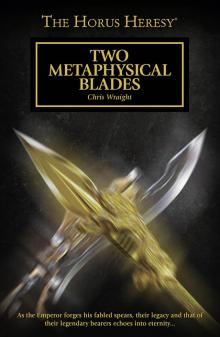 Two Metaphysical Blades
Two Metaphysical Blades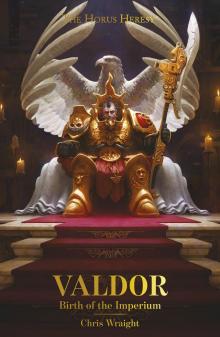 Valdor: Birth of the Imperium
Valdor: Birth of the Imperium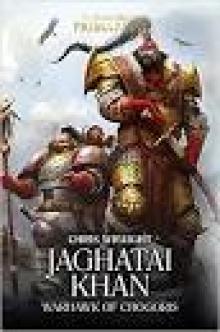 JAGHATAI KHAN WARHAWK OF CHOGORIS
JAGHATAI KHAN WARHAWK OF CHOGORIS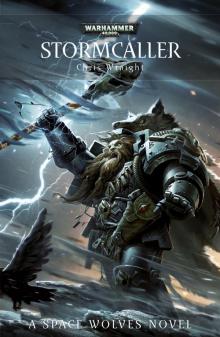 Stormcaller
Stormcaller Child of Chaos
Child of Chaos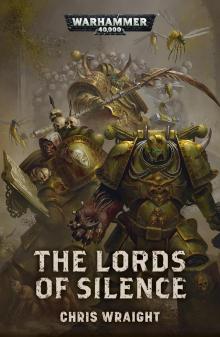 The Lords of Silence
The Lords of Silence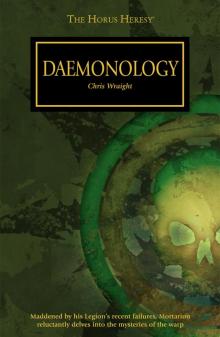 Daemonology
Daemonology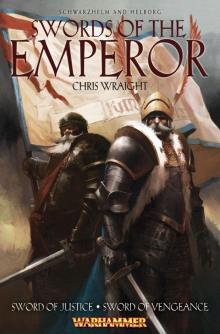 Swords of the Emperor
Swords of the Emperor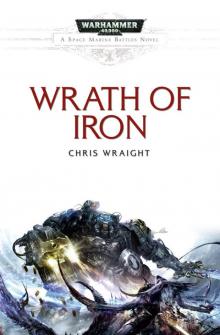 Wrath of Iron
Wrath of Iron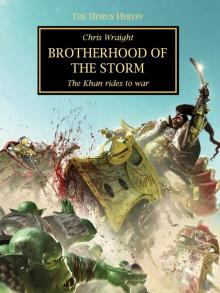 Brothers of the Storm
Brothers of the Storm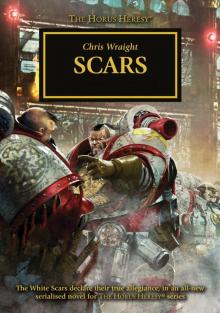 Horus Heresy: Scars
Horus Heresy: Scars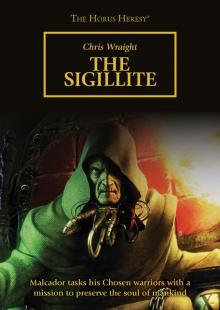 The Sigillite
The Sigillite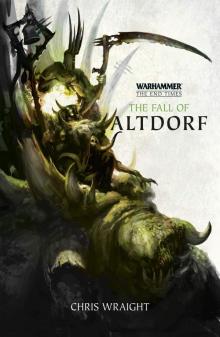 The End Times | The Fall of Altdorf
The End Times | The Fall of Altdorf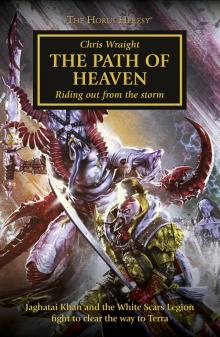 The Path of Heaven
The Path of Heaven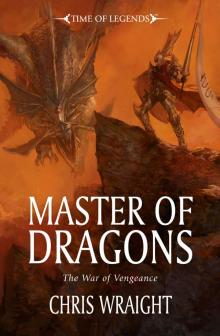 Master of Dragons
Master of Dragons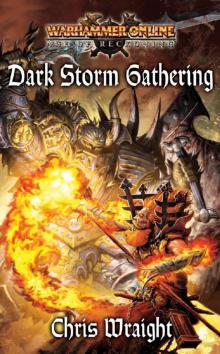 WH-Warhammer Online-Age of Reckoning 02(R)-Dark Storm Gathering
WH-Warhammer Online-Age of Reckoning 02(R)-Dark Storm Gathering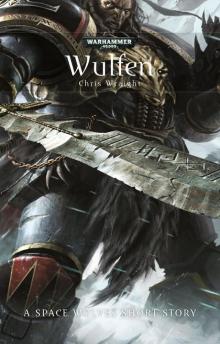 Wulfen
Wulfen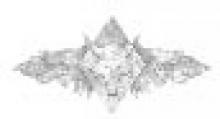 Battle Of The Fang
Battle Of The Fang Onyx
Onyx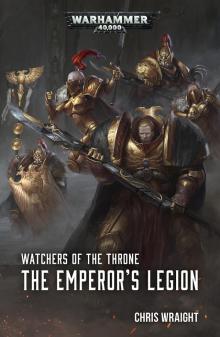 Watchers of the Throne: The Emperor’s Legion
Watchers of the Throne: The Emperor’s Legion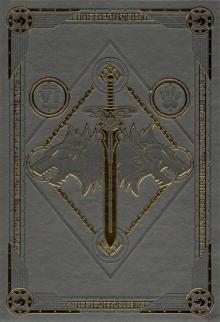 Leman Russ: The Great Wolf
Leman Russ: The Great Wolf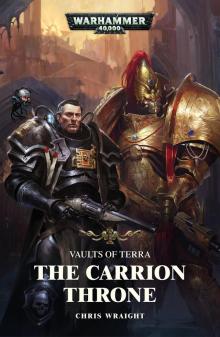 Vaults of Terra: The Carrion Throne
Vaults of Terra: The Carrion Throne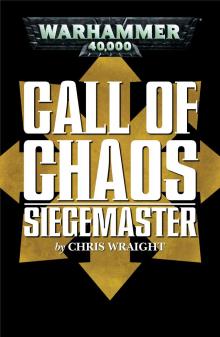 Siegemaster
Siegemaster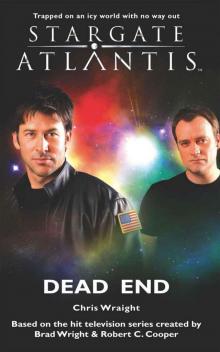 STARGATE ATLANTIS: Dead End
STARGATE ATLANTIS: Dead End Scars
Scars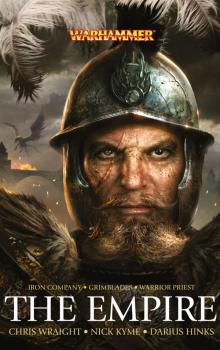 The Empire Omnibus
The Empire Omnibus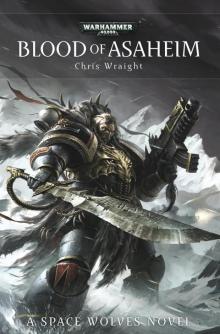 Blood of Asaheim
Blood of Asaheim